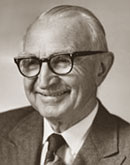The Pure Water Gazette Proudly Awards Its Celebrated and Much Coveted Hero Award To
the late Senator Wayne Morse (1900-1974) of Oregon.
Where is Wayne Morse Now that We Need Him?
Ever heard of Wayne Morse? Probably most younger readers haven’t. In the McCarthy era, he was a staunch opponent of the anti-Communist madness that took over our government. He was an outspoken defender of civil liberties during his twenty-four years in the Senate.
Originally a liberal Republican, he abandoned his party affiliation in protest of Eisenhower’s choice of Richard Nixon as his vice-presidential candidate. For a time he sat in the center aisle of the Senate as an independent before eventually becoming a Democrat. . Morse made many enemies, and these included five presidents, since he usually voted his own mind and did not bow to party pressures. It was after he had become a Democrat that he drew the ire of the Democratic administration of Lyndon Johnson for refusing to toe the party line.
But for that story, you’ll have to read Norman Solomon’s excellent article about the Sept. 11, 2001 attacks on New York and Washington, and a subsequent Solomon article about the Iraqui crisis in July 2002.
Here is an excerpt from Mr. Solomon’s article about Senator Morse:
In early August 1964, Morse was one of only two senators to vote against the Tonkin Gulf resolution, which served as a green light for the Vietnam War. While reviled by much of the press in his home state of Oregon as well as nationwide, he persisted with fierce oratory for peace. It would have been much easier to acquiesce to the media’s war fever. But Morse was not the silent type, especially in matters of conscience.
On Feb. 27, 1968, I sat in a small room at the Capitol to watch a hearing of the Senate Foreign Relations Committee. Six members of the panel were seated around a long table. Most of all, I remember Morse’s voice, raspy and urgent.
“My views are no longer lonely,” he noted at one point, adding: “You have millions of people who are not going to support this tyranny that American boys are being killed in South Vietnam to maintain in power.”
Morse summed up his position on negotiations between the U.S. government and its Vietnamese adversaries: “Who are we to say there have to be two Vietnams? They are not going to do it and they shouldn’t do it. There isn’t any reason in the world why the North Vietnamese and the Vietcong should ever come to a negotiating table on the basis that there must be two Vietnams.”
Moments before the hearing adjourned, Morse said that he did not “intend to put the blood of this war on my hands.”
At the time, Oregon’s senior senator was remarkable because he challenged the morality — not just the “winability” — of the war. He passionately asserted that the United States had no right to impose its will on the world. In the process, he made enemies of many fellow Democrats, including President Lyndon Johnson.
Like most heretics, Morse suffered consequences. After 24 years in the Senate, he lost a race for re-election in November 1968. The winner was a slick politician named Robert Packwood, who denounced Morse’s antiwar fervor.
In his lifetime, Morse became a media pariah. In the quarter-century since his death, political reporters have rarely mentioned his name.
“I don’t know why we think, just because we’re mighty, that we have the right to try to substitute might for right,” Morse said on national television in 1964. “And that’s the American policy in Southeast Asia — just as unsound when we do it as when Russia does it.”
Three years later, he declared: “We’re going to become guilty, in my judgment, of being the greatest threat to the peace of the world. It’s an ugly reality, and we Americans don’t like to face up to it. I hate to think of the chapter of American history that’s going to be written in the future in connection with our outlawry in Southeast Asia.”
Such heresy infuriated many powerful politicians — and journalists — while Wayne Morse did all he could to block a war train speeding to catastrophe.




